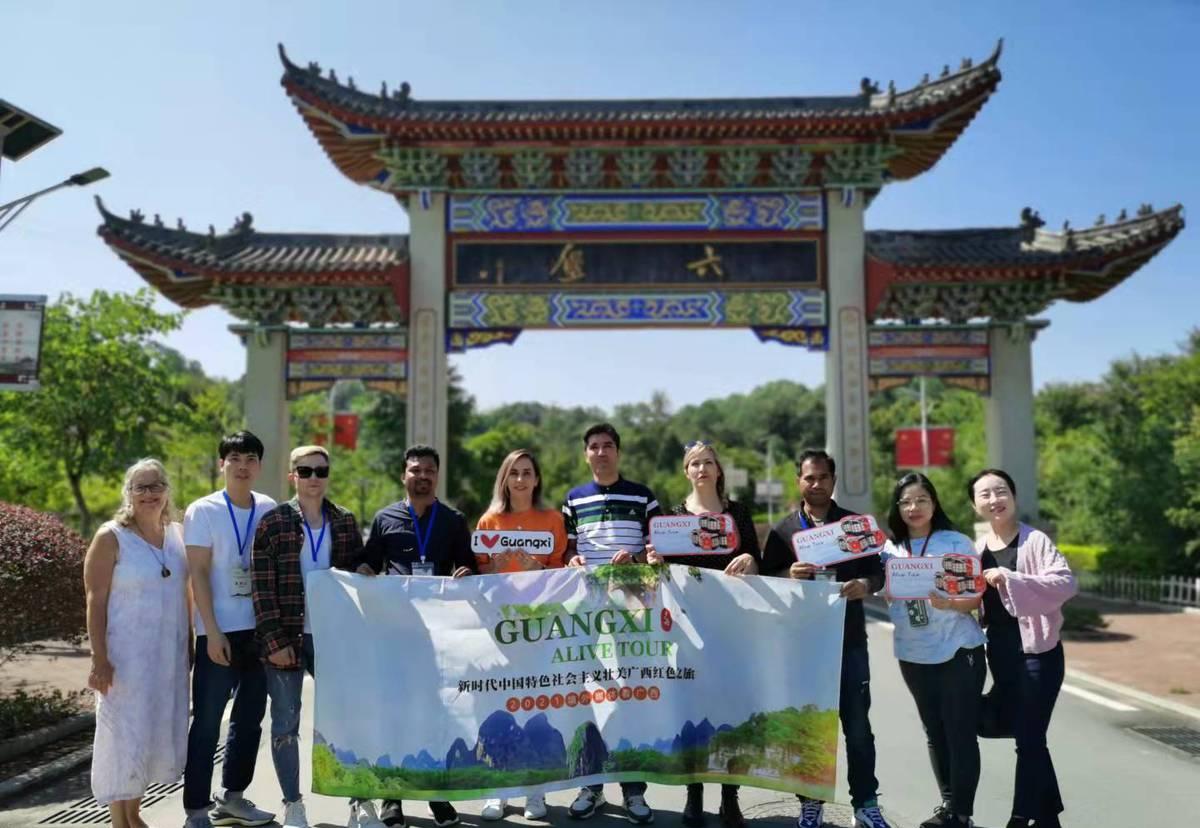On October 26, the theme interview activity of "The Magnificent Red Journey of Guangxi with Chinese Characteristics in the New Era - 2021 Overseas Media Look at Guangxi" Wuzhou Station walked into the national characteristic town - Liubao Town, Cangwu County to visit and interview.

Cangwu is one of the birthplaces of Lingnan tea culture, and Liubao Town is the tea production center of Cangwu. Liupao tea, named because of its origin and main production in Liubao Town, Cangwu County, is a famous black tea in Guangxi, which has a production history of more than 1,500 years. At that time, the starting point of the "Tea Boat Ancient Road" - Liupao Hekou Wharf boats came and went, and Liupao Tea was transported along the Xijiang River from Wuzhou to Guangzhou, re-exported to Hong Kong, and then exported to Nanyang. Because of its effects of dispelling dampness and warming the stomach, eliminating food and relieving grease, Liupao tea is deeply loved by the people of Southeast Asian countries and has become a "overseas Chinese tea", which is one of the important commodities of the ancient Maritime Silk Road.
Liupao tea, known for its "red, thick, aged and mellow", has a mellow taste and a long taste, and the older the better. Anyone who has drunk Liupao tea will have a fondness for its "Chinese red" tea soup color. Liupao Old Tea Lady is a very unique product of Liupao Tea, which can only be produced in Liupao Town so far, because of the unique medicinal aroma and variety, there is no kneading in the process of Liupao Old Tea Woman, so it still exists in its original form.
The Liupao Tea Museum has collected more than 100 pieces of tea culture and cultural relics, ancient Cangwu cultural relics, and production tools. Through visiting the museum, the overseas interview group has a more comprehensive understanding of the history and industry of Liupao tea. In the late Qing Dynasty and the Republic of China, the Liupao Tea Farmers' Association prepared Liupao tea and salt in exquisite bamboo utensils for their married daughters; tea originated from the mountains, and salt originated from the sea, which means the blessing of the newcomer's "Mountain Alliance Sea Oath". After listening to the narrator's introduction, the Iranian foreign journalist couple Ihsan and Fariba were touched by the different deep love and affection that tea farmers gave Liupao tea.
Liupao tea making technology is a representative project of national intangible cultural heritage. Montenegro Stone Tea Factory, originating from the traditional Liupao tea inheritance family, is also a tea enterprise with two non-hereditary heirs at the national and autonomous region levels. Wei Jiequn, the inheritor of the national intangible cultural heritage of Liupao tea making technology, has adhered to the ancient method of hand-making tea for 40 years, passing on hands and hearts, giving tea leaves the perception of the craftsman's heart. Elder Wei Jiequn introduced several key processes of Liupao tea production, such as "picking green, drying green, killing green, kneading, drying, and aging", and foreign friends were eager to try tea picking, kneading, roasting tea, and participating in handmade tea making.
Andy, a Ukrainian international student, received praise from Wei Jie for his kneading and stir-frying techniques, "This young man seems to have learned to stir-fry tea before." Liu Xiaodao, a German ecologist, praised Liupao Tea: "I have been in China for decades, I have drunk so many kinds of tea, I have only heard of some processes of tea making before, but today it is the first time I have experienced that I can roast tea leaves by myself and feel the temperature of tea leaves." I also learned more about tea culture, compared to green tea, Liupao tea can be brewed more than twenty times and can be drunk overnight. Liupao tea also has medicinal properties. I think today I have truly arrived in a mysterious place in China. ”
Wei Jiequn's daughter, Shi Fengfei, is a representative inheritor of the autonomous region level, a national model worker, and a national leader in rural youth getting rich. As a young teamaker, she integrates innovation in adhering to traditional skills and shares liupao tea making skills with villagers in an easy-to-understand training course. The Party Branch of Heishi Mountain Tea Factory supports and trains handmade tea farmers in the mode of "company + farmer", and through signing a long-term cooperation agreement, drives tea farmers to engage in the planting, picking and processing of ancient handmade Liupao tea.
(Bangladeshi friend Ade posted on overseas social media Facebook platforms)
(Iranian friend Fariba posted on overseas social media photo wall)
(Vietnamese friend Pei Chun Mei Zalo posted a post)
(Iranian friend Ihsan posted on overseas social media photo wall)
With the theme of Liupao Tea, Liubao Town has formed a multi-format integration development model such as "tea industry + culture + eco-tourism" to help promote rural revitalization. "These villages, in my opinion, not only retain their original rural characteristics, but also help improve the lives of villagers and improve infrastructure." This is a good revitalization initiative and worth learning. Nguyen Dinh Ho, a Vietnamese university teacher, said. (China Daily Guangxi Reporter Station)
Source: China Daily